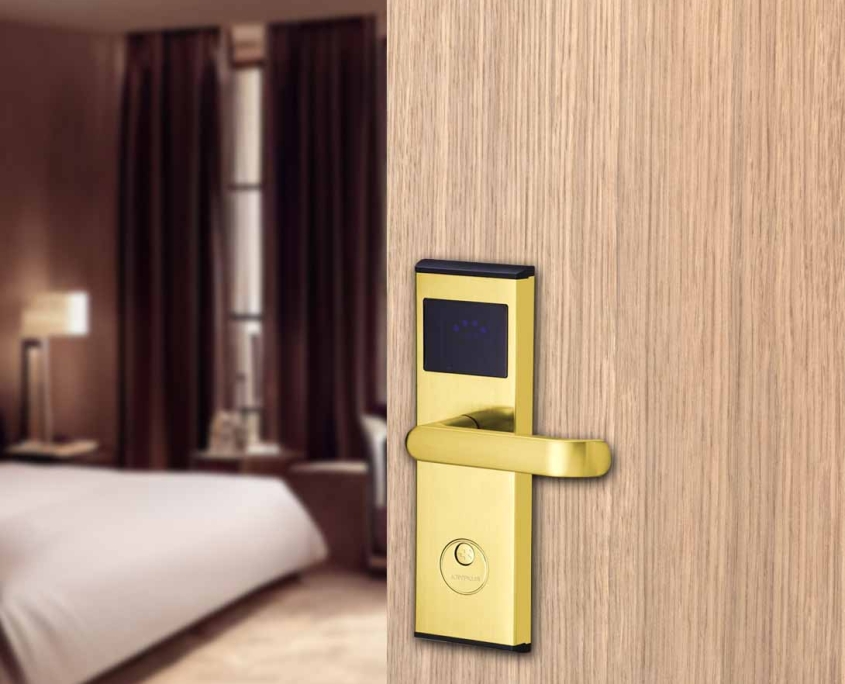How Do RFID Hotel Keys Work?
If you’ve stayed in a hotel recently, chances are you’ve used a key card to access your room. But these aren’t the old magnetic stripe cards you might remember from years ago—today, most hotels use RFID (Radio-Frequency Identification) keys for a faster, more secure experience.
So, how do these high-tech keys work? Why are they replacing traditional keys and magnetic cards? And what makes them more convenient for guests? In this article, we’ll break down everything you need to know about RFID hotel keys in a way that’s easy to understand.
What Is an RFID Hotel Key?
An RFID hotel key is a plastic card (or sometimes a wristband or smartphone app) that uses radio waves to communicate with the door lock. Unlike old-fashioned metal keys or magnetic stripe cards (which require swiping), RFID keys simply need to be tapped or held near the lock to work.
RFID vs. Magnetic Stripe Cards: What’s the Difference?
Before RFID, most hotels used magnetic stripe keys (like credit cards). These worked by swiping the card through a reader, which would read the encoded data. However, magnetic stripes had several problems:
- Easy to demagnetize (keeping them near phones or other cards could wipe the data).
- Wear and tear (swiping repeatedly could damage the stripe).
- Security risks (they could be copied or hacked relatively easily).
RFID keys solve these issues by using contactless technology, similar to how Apple Pay or contactless credit cards work.
How RFID Hotel Keys Actually Work
1. The RFID Chip Inside the Key
Every RFID key contains a tiny microchip and an antenna. When you bring the key close to the lock, the lock’s reader sends out a radio signal, which powers the chip just enough to transmit a unique code back to the reader.
2. The Door Lock’s RFID Reader
The door lock has a built-in RFID scanner that constantly emits a low-power radio signal. When you hold your key near it (usually within 1-2 inches), the chip in the key gets activated and sends back an encrypted signal.
3. Authentication & Access Granting
The lock’s system checks if the key’s code matches an approved code in the hotel’s database. If it does—click!—the door unlocks. If not, it stays locked.
This whole process happens in less than a second, making it much faster than inserting a key or swiping a magnetic card.

Why Hotels Love RFID Keys
Better Security
- No easy copying: Unlike traditional keys (which can be duplicated) or magnetic cards (which can be skimmed), RFID keys use encrypted signals that are much harder to hack.
- Instant deactivation: If a guest loses their key, the front desk can disable it immediately and issue a new one, unlike metal keys that require a full lock change.
More Convenience for Guests
- No swiping or inserting—just tap and go.
- Works through wallets or phone cases (no need to take it out).
- Can be combined with mobile keys (some hotels let you use your smartphone as an RFID key).
Cost-Effective for Hotels
- Longer-lasting: No moving parts or magnetic strips to wear out.
- Reusable: Cards can be reprogrammed for new guests.
Can RFID Hotel Keys Be Hacked?
While RFID keys are more secure than magnetic stripe cards, no system is 100% foolproof. Some concerns include:
- Cloning attacks: Sophisticated hackers could potentially copy an RFID signal if they get close enough.
- Signal interception: Rare, but possible with advanced equipment.
However, most hotels use high-frequency (HF) RFID (like NFC), which requires very close proximity, reducing the risk. Some also use rolling codes (like car key fobs) that change with each use, making them harder to copy.
The Future: Smartphone & Wearable RFID Keys
Many hotels are moving beyond plastic cards and adopting:
- Mobile keys (via the hotel’s app, using Bluetooth or NFC).
- RFID wristbands (popular in resorts for keyless entry + payments).
- Biometric access (fingerprint or facial recognition for ultra-high-security areas).
Final Thoughts
RFID hotel keys offer a faster, more secure, and more convenient way to access your room compared to old-school keys or magnetic cards. While no technology is perfect, RFID is a major upgrade—making check-ins smoother and giving hotel staff better control over room access.
Next time you tap your key card to enter your room, you’ll know exactly how that little piece of tech works!
Would you prefer an RFID key, a smartphone app, or a traditional key? Let us know in the comments!









